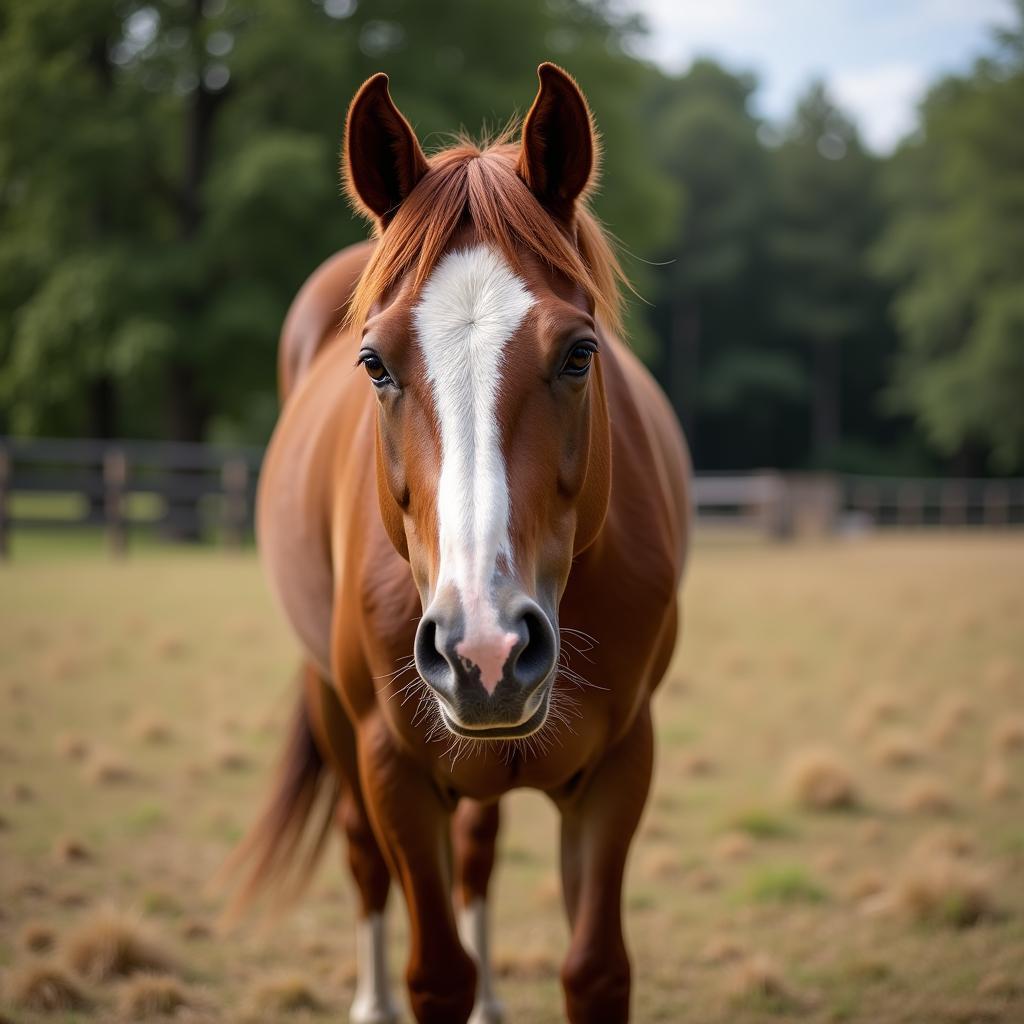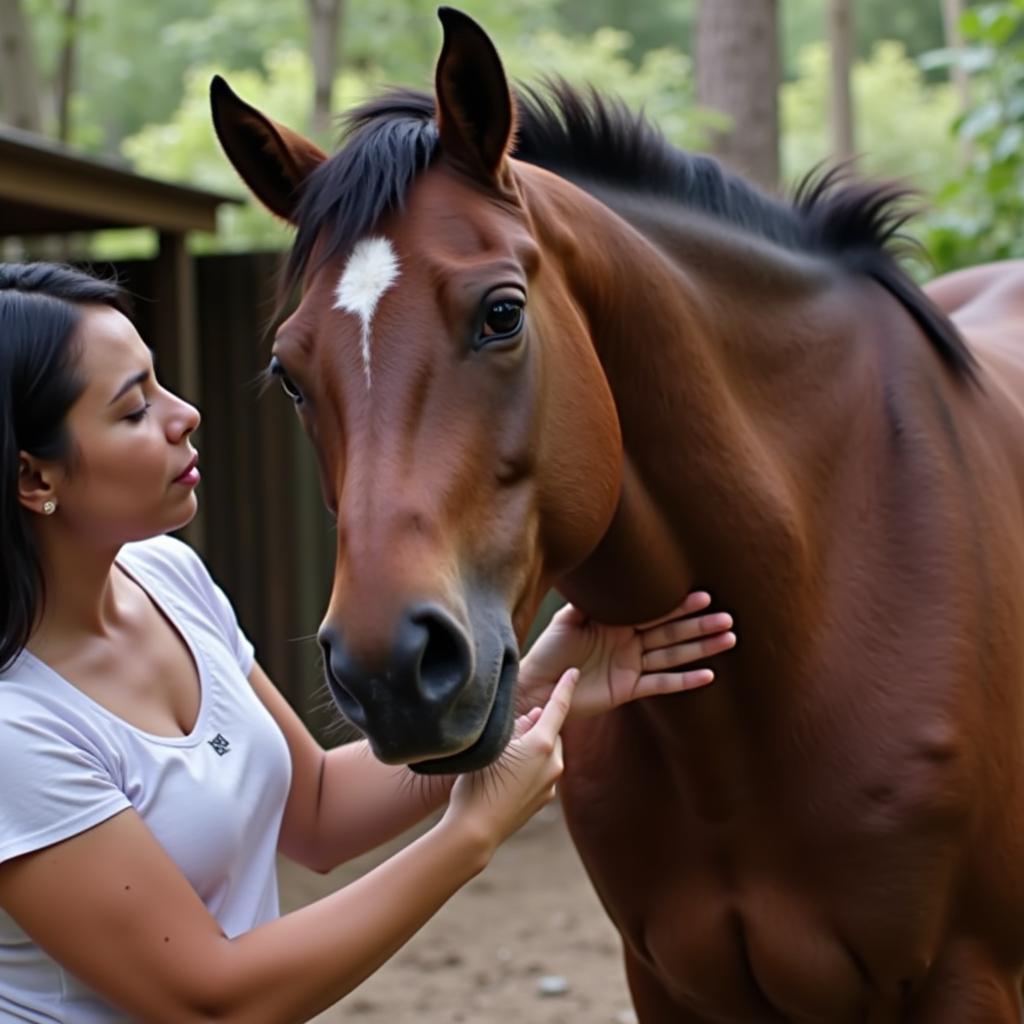A Scared Horse can be dangerous to themselves and those around them. Understanding the reasons behind their fear and knowing how to react appropriately is crucial for both horse and handler safety. This article will delve into the complexities of equine fear, offering practical advice and techniques for calming a frightened horse and building a trusting relationship.
Recognizing Signs of Fear in Horses
Horses communicate their fear through a complex language of body language and vocalizations. A scared horse may exhibit a range of behaviors, from subtle signs like widened eyes and flared nostrils to more dramatic displays such as bolting, rearing, or kicking. Recognizing these signs early is key to preventing a potentially dangerous situation. These signs can include pinned ears, a tense body posture, sweating, trembling, and an elevated heart rate. A scared horse might also snort, whinny anxiously, or even try to bite. Subtle shifts in their usual demeanor can also indicate underlying anxiety. Being attuned to these nuances will allow you to address the horse’s fear before it escalates.
After this short intro about recognizing fear, you might also be interested in learning about how to get your horse to lay down, detailed in our article on how do you get a horse to lay down.
 Scared Horse Showing Body Language of Fear
Scared Horse Showing Body Language of Fear
Common Causes of Fear in Horses
Understanding the root of a horse’s fear is paramount in addressing it effectively. Horses, being prey animals, are naturally predisposed to fear unfamiliar sights, sounds, and smells. A sudden loud noise, a flapping plastic bag, or an unusual object can easily startle them. Their fear response is a survival mechanism, honed over millennia. Other common causes include unfamiliar environments, changes in routine, and negative experiences. Even seemingly innocuous things like shadows or reflections can trigger a fear response in a sensitive horse. Furthermore, a horse’s past experiences play a significant role in their current fears. A horse that has been mistreated or involved in a traumatic incident may develop long-lasting anxieties.
Addressing Fear Triggers
Once you have identified potential triggers, you can begin the process of desensitization and counter-conditioning. This involves gradually exposing the horse to the frightening stimulus at a safe distance and rewarding calm behavior. Remember, patience and consistency are key.
What to Do When a Horse is Scared
When confronted with a scared horse, your immediate reaction can significantly impact the outcome. The most important thing is to remain calm and assertive. Avoid sudden movements or loud noises, which can further frighten the animal. Speak to the horse in a soothing voice and offer reassurance. If possible, gently remove the source of the fear. If the horse is in a safe environment, allow it to move and work through its fear. If you find yourself facing other challenges with your scared horse, perhaps our article on horses being scared can provide further insights: horses scared.
Calming Techniques for a Scared Horse
Several techniques can help calm a scared horse. Deep breathing exercises, gentle stroking, and ground work exercises can help regulate the horse’s heart rate and redirect its focus. Establishing a clear leadership role through calm and assertive body language can also instill confidence in the horse.
If you’re looking for some fun and less stressful activities with your horse, you might consider checking out our article about horse balloons: horse balloons.
Building Trust and Confidence
Building trust with a scared horse takes time and patience. Consistent positive reinforcement, gentle handling, and creating a safe and predictable environment are crucial. Focusing on building a positive relationship will go a long way in helping the horse overcome its fears.
It’s important to ensure safety for both horse and rider on the roads. Our article on horse crossing signs offers valuable information on this topic.
 Calming a Scared Horse with Gentle Stroking
Calming a Scared Horse with Gentle Stroking
Preventing Fear in Horses
While not all fear responses are preventable, creating a positive and predictable environment can minimize the likelihood of a horse becoming scared. This includes providing consistent routines, gradual introductions to new experiences, and positive reinforcement training. Early socialization and exposure to various stimuli can also help build a horse’s confidence and resilience.
Perhaps you’re looking for fun ways to bond with your horse? Check out our article about Halloween costumes: halloween costume for horse and rider.
Conclusion
Dealing with a scared horse requires patience, understanding, and a commitment to building trust. By recognizing the signs of fear, understanding its causes, and implementing appropriate calming techniques, you can help your horse overcome its anxieties and develop into a confident and well-adjusted partner. Remember, a calm horse is a happy horse, and a scared horse needs our support and guidance.
FAQ
-
What are the common signs of a scared horse? Signs include pinned ears, flared nostrils, wide eyes, tense body posture, sweating, and bolting.
-
How can I calm a scared horse? Speak softly, remove the source of fear if possible, and use calming techniques like deep breathing and gentle stroking.
-
What are some common causes of fear in horses? Loud noises, unfamiliar objects, changes in routine, and past trauma can all trigger fear.
-
How can I prevent my horse from becoming scared? Create a predictable environment, introduce new experiences gradually, and provide positive reinforcement.
-
What should I do if my horse is scared and I am unsure how to react? Remain calm, speak soothingly, and seek professional advice if necessary.
-
Can a horse overcome its fears? Yes, with patience, consistent training, and a positive environment, horses can overcome their fears.
-
How can I tell if my horse’s fear is serious? If the fear is persistent, impacting the horse’s well-being, or causing dangerous behaviors, consult a veterinarian or equine behaviorist.
For any assistance or further inquiries, please contact us at Phone Number: 0772127271, Email: [email protected] Or visit us at: QGM2+WX2, Vị Trung, Vị Thuỷ, Hậu Giang, Việt Nam. We have a 24/7 customer service team.